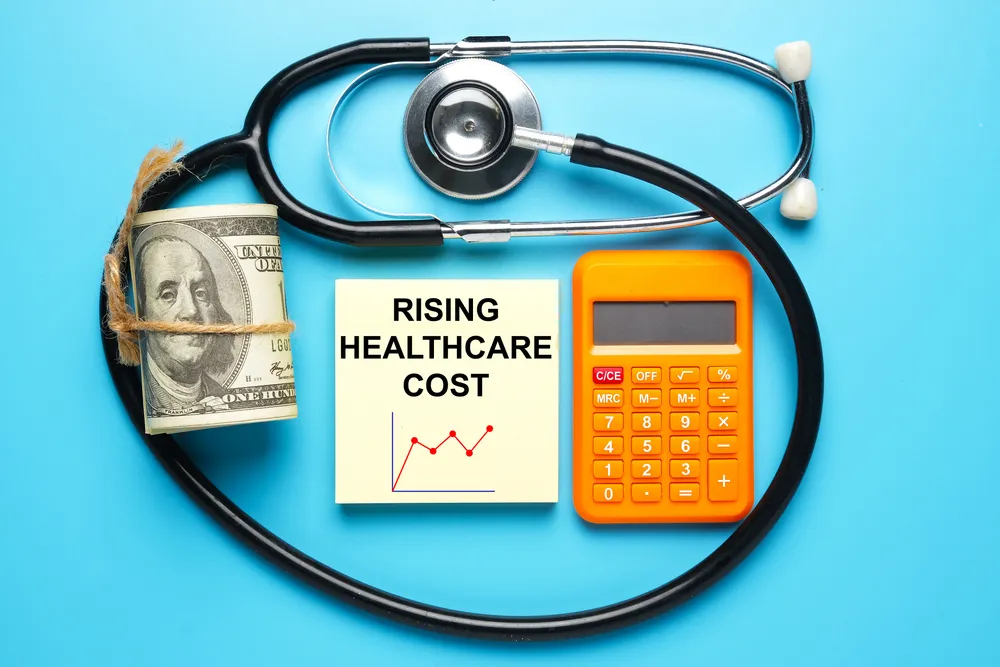From cameras to alarm clocks and phone books, everything you need is now on your smartphone. That’s because convenience is all that matters in the modern world. So why should managing your practice be any different?...
Did you know that six in ten adults across the United States suffer from some kind of chronic disease? These chronic illnesses can include cancer, diabetes, and various cardiovascular diseases. Therefore, CDC spends 90% of its allocated annual healthcare budget on people with chronic and mental health conditions. One way to address this concern is to implement EHR software for chronic illness management in healthcare practices.
Research proves that EHRs play a pivotal role in enhancing the early detection and improved treatment of chronic diseases through increased accuracy and accessibility of patient data. Additionally, electronic health records can reduce the cost of chronic disease management in a healthcare practice.
Here, we discuss the rising prevalence of chronic illnesses across the United States and the numerous benefits of implementing EHR software in their effective management.

The Rising Prevalence of Chronic Illnesses
The prevalence of chronic illnesses in the United States has reached alarming levels, with nearly 60% of adults living with at least one chronic disease. These conditions, including diabetes, cancer, and cardiovascular disease, now stand as the leading causes of death in the nation. Moreover, the burden of chronic illnesses extends beyond health, profoundly affecting economic aspects.
● The Mounting Financial Burden of Chronic Diseases
Chronic conditions inflict substantial financial strain, with costs for individuals grappling with these illnesses averaging a staggering $6,032 annually. This figure starkly contrasts those without chronic conditions, revealing a cost five times higher. Furthermore, about 40% of American adults are contending with multiple chronic conditions (MCC). As evidence continues to grow, it becomes apparent that one chronic illness significantly elevates the risk of developing others, particularly as individuals age.
The financial ramifications of chronic illnesses are exemplified by the costs associated with specific conditions. In the case of diabetes, total costs in the United States surged to an astonishing $327 billion in 2017. This colossal sum includes $237 billion in direct medical expenses and an additional $90 billion attributed to lost economic productivity.
Similarly, cardiovascular disease casts a long and costly shadow. Responsible for one in every three American deaths, it claims the lives of 859,000 people annually. Beyond the human toll, the financial impact is substantial, with heart disease and stroke collectively incurring $216 billion in healthcare system costs, accompanied by $147 billion in lost job productivity.
● Chronic Diseases Spending to Reach $2 Trillion by 2030
The prognosis for the nation's economy paints a concerning picture. A recent publication predicts that treating the seven most common chronic diseases, combined with productivity losses, will amass a staggering annual cost of $2 trillion to the U.S. economy by 2030, amounting to $8,600 per person.
The mounting prevalence of chronic illnesses underscores the urgency for comprehensive and effective management strategies. One such approach is implementing EHR software, which is emerging as a pivotal tool to address this multifaceted challenge.

Benefits of EHR Software in Chronic Disease Management
As evident from the data cited above, addressing the grave concern of mounting human and financial costs due to chronic diseases has become indispensable. Here is how electronic health record (EHR) software provides a space for improvement.
1. Built-in Alerts Can Lead to Better Screening
One of the significant advantages of implementing EHR in chronic illness management is the integration of built-in alerts. These alerts serve as proactive reminders, helping healthcare providers improve the screening process for patients with chronic conditions.
Moreover, EHR systems can be tailored to trigger notifications for scheduled screenings, follow-up appointments, or preventive measures. This automation ensures that patients don't miss essential tests or check-ups. Thus, it ultimately leads to early detection and timely interventions, which are crucial in managing chronic illnesses effectively.
For example, a study highlighted that built-in alerts in EHR systems led to a substantial improvement in the screening and treatment of hepatitis C virus (HCV) infection in the study participants.
2. CDS Tools Can Enhance Chronic Disease Management
Clinical decision support (CDS) tools integrated into EHR technology are powerful allies in enhancing chronic disease management. These tools serve as virtual assistants, aiding healthcare providers in making well-informed patient decisions. Research underscores the significance of CDS tools in improving cancer care and, more specifically, lung cancer treatment.
For instance, an article ranked EHR software among the top five tools for improving health care. In situations where healthcare providers do not regularly treat lung cancer, they may overlook crucial genetic alterations that significantly influence treatment decisions. CDS tools bridge this gap, ensuring that all relevant data is considered.
When applied in chronic illness management, CDS tools are pivotal in increasing screening rates and ensuring patients receive appropriate treatments. This results in improved health outcomes, as early detection and tailored treatment strategies are fundamental to managing chronic conditions effectively.
3. EHR Use Can Help in Early Detection of Chronic Diseases
The efficient use of Electronic Health Records (EHR) software can be a game-changer in the early detection of chronic diseases. Studies have demonstrated that EHR technology has the potential to empower healthcare providers to predict certain conditions before they are even diagnosable.
Through meticulous analysis of patient health records, EHR technology can reveal subtle yet critical clues that may lead to the prediction of heart failure. This predictive power holds immense value, particularly in the realm of chronic disease management. That’s because it enables healthcare providers to initiate preventive measures and interventions at the earliest stages of disease development.
Early detection is a cornerstone of effective chronic illness management. Moreover, it allows for timely and targeted interventions, ultimately improving patient outcomes and reducing the burden of chronic diseases on both patients and the healthcare system. Hence, with its data-driven capabilities, EHR emerges as a critical tool in the ongoing battle against chronic conditions.
4. Integrating EHR Software Can Reduce Healthcare Cost
Healthcare costs have been on the rise, and chronic illnesses contribute significantly to these expenses. The incorporation of EHR systems offers a promising solution to this issue. EHR systems help healthcare providers optimize their operations by streamlining administrative tasks and reducing reliance on paper-based records. This increased efficiency translates into cost savings as the need for physical storage, manual data entry, and redundant administrative tasks diminishes.
Incorporating EHR not only reduces administrative overhead but also enhances the accuracy and completeness of medical records. This can lead to fewer medical errors, misdiagnoses, and associated costs.
While the initial implementation of EHR requires an investment, it's a strategic financial decision in the long run. Therefore, integrating EHR software is a key strategy in pursuing cost-effective and high-quality chronic illness management.
Practice EHR - ONE That Optimizes Chronic Illness Management!
With its resourceful EHR software, Practice EHR serves as an all-in-one solution for chronic illness management. It includes customizable templates for effortless data recording and an intuitive patient portal to enhance communication between doctors and patients, offering healthcare providers a complete package for optimizing the management of chronic diseases. Moreover, Practice EHR’s accurate medical coding and billing services mean no claim denials or returns, thereby contributing to your practice’s financial success.
To learn more about how Practice EHR can assist your practice in achieving optimal patient care in chronic disease management, Request a Demo now. Our customer support team is available round-the-clock to assist you with your queries!
Topics: Patient Care, EHR Solution, digital age, Industry Update, Revenue Cycle Management, EMR, Medical billing services, EHR, The ONE, Medical Practice Management Software, EHR Features, EHR for Chronic Illness
RECENT POSTS



TOPICS
- EHR Solution (147)
- EHR (84)
- Patient Care (77)
- digital age (77)
- Medical Billing (72)
- Specialty-Specific EHR (70)
- Integrated EHR (59)
- Small Practice (56)
- Technology in Healthcare (55)
- Industry Update (50)
- New Technology (47)
- Medical billing services (45)
- RCM (43)
- EHR Features (42)
- Cloud-based EHR (39)
- Practice EHR News (39)
- Healthcare Office Management (37)
- Kiosk (28)
- ePrescribing (21)
- HIPAA Security (20)
- Telemedicine (14)
- EMR (12)
- Revenue Cycle Management (12)
- Practice Management Software (11)
- Client Favorites (10)
- Practice Automation (10)
- The ONE (10)
- Urgent Care (8)
- MACRA/MIPS (7)
- Patient Portal (7)
- Switching to New EHR (6)
- events (6)
- E-Prescribing (5)
- Product Updates (5)
- TeleVisit (5)
- AI Solutions (4)
- Insider (4)
- Internal Medicine EHR (4)
- MIPS (4)
- Podiatry (4)
- Podiatry EHR (4)
- AI Scribing (3)
- HIPAA (3)
- MIPS Reporting (3)
- Regulatory Updates (3)
- AI scanning (2)
- Billing for Private Practices (2)
- Clearinghouse (2)
- Dermatology EHR (2)
- EHR Scheduling (2)
- Foot and Ankle Care (2)
- Foot and Ankle EHR (2)
- Health records 101 (2)
- Integrated Practice Management (2)
- Medical Credentialing (2)
- Medical Practice Management Software (2)
- Orthopedics EHR (2)
- Patient Check-in Kiosk (2)
- Psychiatry EHR (2)
- Quality of Patient Care (2)
- Reporting Under MIPS (2)
- Risk and Liability in Medical Settings (2)
- Telehealth Platform (2)
- Telehealth Platforms (2)
- What Works Clearinghouse (2)
- AI-powered Medical Billing (1)
- Bariatric EHR (1)
- Behavioral Health Practices (1)
- Billing Communication (1)
- Cardiology EHR (1)
- Cash Flow (1)
- Chiropractic EHR (1)
- Data Security (1)
- Dos and Don'ts (1)
- EHR Guides (1)
- EHR KPIs (1)
- EHR Questions to Ask (1)
- EHR for Chiropractors (1)
- EHR for Chronic Illness (1)
- EMR vs EHR Difference (1)
- ENT EHR (1)
- Eligibility Verification in Medical Billing (1)
- Endocrinology EHR (1)
- Family Medicine (1)
- Family Medicine EHR (1)
- Gastroenterology (1)
- Gastroenterology EHR (1)
- General Surgery EHR (1)
- Geriatrics EHR (1)
- Guides (1)
- Healthcare Compliance Certification (1)
- Healthcare Practice Office Management (1)
- Help Center Videos (1)
- Insurance Reimbursement (1)
- KPI (1)
- Key Performance Indicators (1)
- Lab Processing (1)
- MACRA (1)
- Medical Billing Partner (1)
- Medical Coding Services (1)
- Mobile EHR (1)
- Nephrology EHR (1)
- Neurology EHR (1)
- Pain Management EHR (1)
- Pediatrics EHR (1)
- Physical Therapy EHR (1)
- Practice Cash Flow (1)
- PracticeEHR GO App (1)
- Pulmonology EHR (1)
- Simplify Practice Management (1)
- Staffing in Healthcare (1)
- Switch Medical Billing Providers (1)
- Urgent Care Medical Billing (1)
- Urology EHR (1)
- insurance claim denials (1)







